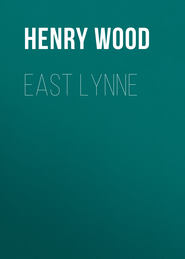По всем вопросам обращайтесь на: info@litportal.ru
(©) 2003-2024.
✖
Elster's Folly
Настройки чтения
Размер шрифта
Высота строк
Поля
Elster's Folly
Henry Wood
Mrs. Henry Wood
Elster's Folly: A Novel
CHAPTER I.
BY THE EARLY TRAIN
The ascending sun threw its slanting rays abroad on a glorious August morning, and the little world below began to awaken into life—the life of another day of sanguine pleasure or of fretting care.
Not on many fairer scenes did those sunbeams shed their radiance than on one existing in the heart of England; but almost any landscape will look beautiful in the early light of a summer's morning. The county, one of the midlands, was justly celebrated for its scenery; its rich woods and smiling plains, its river and gentler streams. The harvest was nearly gathered in—it had been a late season—but a few fields of golden grain, in process of reaping, gave their warm tints to the landscape. In no part of the country had the beauties of nature been bestowed more lavishly than on this, the village of Calne, situated about seven miles from the county town.
It was an aristocratic village, on the whole. The fine seat of the Earl of Hartledon, rising near it, had caused a few families of note to settle there, and the nest of white villas gave the place a prosperous and picturesque appearance. But it contained a full proportion of the poor or labouring class; and these people were falling very much into the habit of writing the village "Cawn," in accordance with its pronunciation. Phonetic spelling was more in their line than Johnson's Dictionary. Of what may be called the middle class the village held few, if any: there were the gentry, the small shopkeepers, and the poor.
Calne had recently been exalted into importance. A year or two before this bright August morning some good genius had brought a railway to it—a railway and a station, with all its accompanying work and bustle. Many trains passed it in the course of the day; for it was in the direct line of route from the county town, Garchester, to London, and the traffic was increasing. People wondered what travellers had done, and what sort of a round they traversed, before this direct line was made.
The village itself lay somewhat in a hollow, the ground rising to a gentle eminence on either side. On the one eminence, to the west, was situated the station; on the other, eastward, rose the large stone mansion, Hartledon House. The railway took a slight détour outside Calne, and was a conspicuous feature to any who chose to look at it; for the line had been raised above the village hollow to correspond with the height at either end.
Six o'clock was close at hand, and the station began to show signs of life. The station-master came out of his cottage, and opened one or two doors on the platform. He had held the office scarcely a year yet; and had come a stranger to Calne. Sitting down in his little bureau of a place, on the door of which was inscribed "Station-master—Private," he began sorting papers on the desk before him. A few minutes, and the clock struck six; upon which he went out to the platform. It was an open station, as these small stations generally are, the small waiting-rooms and offices on either side scarcely obstructing the view of the country, and the station-master looked far out in the distance, towards the east, beyond the low-lying village houses, shading his eyes with his hand from the dazzling sun.
"Her's late this morning."
The interruption came from the surly porter, who stood by, and referred to the expected train, which ought to have been in some minutes before. According to the precise time, as laid down in the way-bills, it should reach Calne seven minutes before six.
"They have a heavy load, perhaps," remarked the station-master.
The train was chiefly for goods; a slow train, taking no one knew how many hours to travel from London. It would bring passengers also; but very few availed themselves of it. Now and then it happened that the station at Calne was opened for nothing; the train just slackened its speed and went on, leaving neither goods nor anything else behind it. Sometimes it took a few early travellers from Calne to Garchester; especially on Wednesdays and Saturdays, Garchester market-days; but it rarely left passengers at Calne.
"Did you hear the news, Mr. Markham?" asked the porter.
"What news?" returned the station-master.
"I heard it last night. Jim come into the Elster Arms with it, and he'd heard it at Garchester. We are going to have two more sets o' telegraph wires here. I wonder how much more work they'll give us to do?"
"So you were at the Elster Arms again last night, Jones?" remarked the station-master, his tone reproving, whilst he passed over in silence Mr. Jones's item of news.
"I wasn't in above an hour," grumbled the man.
"Well, it is your own look-out, Jones. I have said what I could to you at odd times; but I believe it has only tried your patience; so I'll say no more."
"Has my wife been here again complaining?" asked the man, raising his face in anger.
"No; I have not seen your wife, except at church, these two months. But I know what public-houses are to you, and I was thinking of your little children."
"Ugh!" growled the man, apparently not gratified at the reminder of his flock; "there's a peck o' them surely! Here she comes!"
The last sentence was spoken in a different tone; one of relief, either at getting rid of the subject, or at the arrival of the train. It was about opposite to Hartledon when he caught sight of it, and it came on with a shrill whistle, skirting the village it towered above; a long line of covered waggons with a passenger carriage or two attached to them. Slackening its pace gradually, but not in time, it shot past the station, and had to back into it again.
The guard came out of his box and opened the door of one of the carriages—a dirty-looking second-class compartment; the other was a third-class; and a gentleman leaped out. A tall, slender man of about four-and-twenty; a man evidently of birth and breeding. He wore a light summer overcoat on his well-cut clothes, and had a most attractive face.
"Is there any law against putting on a first-class carriage to this night-train?" he asked the guard in a pleasing voice.
"Well, sir, we never get first-class passengers by it," replied the man; "or hardly any passengers at all, for the matter of that. We are too long on the road for passengers to come by us."
"It might happen, though," returned the traveller, significantly. "At any rate, I suppose there's no law against your carriages being clean, whatever their class. Look at that one."
He pointed to the one he had just left, as he walked up to the station-master. The guard looked cross, and gave the carriage door a slam.
"Was a portmanteau left here last night by the last train from London?" inquired the traveller of the station-master.
"No, sir; nothing was left here. At least, I think not. Any name on it, sir?"
"Elster."
A quick glance from the station-master's eyes met the answer. Elster was the name of the family at Hartledon. He wondered whether this could be one of them, or whether the name was merely a coincidence.
"There was no portmanteau left, was there, Jones?" asked the station-master.
"There couldn't have been," returned the porter, touching his cap to the stranger. "I wasn't on last night; Jim was; but it would have been put in the office for sure; and there's not a ghost of a thing in it this morning."
"It must have been taken on to Garchester," remarked the traveller; and, turning to the guard, he gave him directions to look after it, and despatch it back again by the first train, slipping at the same time a gratuity into his hand.
The guard touched his hat humbly; he now knew who the gentleman was. And he went into inward repentance for slamming the carriage-door, as he got into his box, and the engine and train puffed on.
"You'll send it up as soon as it comes," said the traveller to the station-master.
"Where to, sir?"
The stranger raised his eyes in slight surprise, and pointed to the house in the distance. He had assumed that he was known.
"To Hartledon."
Then he was one of the family! The station-master touched his hat. Mr. Jones, in the background, touched his, and for the first time the traveller's eye fell upon him as he was turning to leave the platform.
"Why, Jones! It's never you?"
"Yes, it is, sir." But Mr. Jones looked abashed as he acknowledged himself. And it may be observed that his language, when addressing this gentleman, was a slight improvement upon the homely phraseology of his everyday life.
"But—you are surely not working here!—a porter!"
"My business fell through, sir," returned the man. "I'm here till I can turn myself round, sir, and get into it again."
"What caused it to fall through?" asked the traveller; a kindly sympathy in his fine blue eyes.
Mr. Jones shuffled upon one foot. He would not have given the true answer—"Drinking"—for the world.
"There's such opposition started up in the place, sir; folks would draw your heart's blood from you if they could. And then I've such a lot of mouths to feed. I can't think what the plague such a tribe of children come for. Nobody wants 'em."
Henry Wood
Mrs. Henry Wood
Elster's Folly: A Novel
CHAPTER I.
BY THE EARLY TRAIN
The ascending sun threw its slanting rays abroad on a glorious August morning, and the little world below began to awaken into life—the life of another day of sanguine pleasure or of fretting care.
Not on many fairer scenes did those sunbeams shed their radiance than on one existing in the heart of England; but almost any landscape will look beautiful in the early light of a summer's morning. The county, one of the midlands, was justly celebrated for its scenery; its rich woods and smiling plains, its river and gentler streams. The harvest was nearly gathered in—it had been a late season—but a few fields of golden grain, in process of reaping, gave their warm tints to the landscape. In no part of the country had the beauties of nature been bestowed more lavishly than on this, the village of Calne, situated about seven miles from the county town.
It was an aristocratic village, on the whole. The fine seat of the Earl of Hartledon, rising near it, had caused a few families of note to settle there, and the nest of white villas gave the place a prosperous and picturesque appearance. But it contained a full proportion of the poor or labouring class; and these people were falling very much into the habit of writing the village "Cawn," in accordance with its pronunciation. Phonetic spelling was more in their line than Johnson's Dictionary. Of what may be called the middle class the village held few, if any: there were the gentry, the small shopkeepers, and the poor.
Calne had recently been exalted into importance. A year or two before this bright August morning some good genius had brought a railway to it—a railway and a station, with all its accompanying work and bustle. Many trains passed it in the course of the day; for it was in the direct line of route from the county town, Garchester, to London, and the traffic was increasing. People wondered what travellers had done, and what sort of a round they traversed, before this direct line was made.
The village itself lay somewhat in a hollow, the ground rising to a gentle eminence on either side. On the one eminence, to the west, was situated the station; on the other, eastward, rose the large stone mansion, Hartledon House. The railway took a slight détour outside Calne, and was a conspicuous feature to any who chose to look at it; for the line had been raised above the village hollow to correspond with the height at either end.
Six o'clock was close at hand, and the station began to show signs of life. The station-master came out of his cottage, and opened one or two doors on the platform. He had held the office scarcely a year yet; and had come a stranger to Calne. Sitting down in his little bureau of a place, on the door of which was inscribed "Station-master—Private," he began sorting papers on the desk before him. A few minutes, and the clock struck six; upon which he went out to the platform. It was an open station, as these small stations generally are, the small waiting-rooms and offices on either side scarcely obstructing the view of the country, and the station-master looked far out in the distance, towards the east, beyond the low-lying village houses, shading his eyes with his hand from the dazzling sun.
"Her's late this morning."
The interruption came from the surly porter, who stood by, and referred to the expected train, which ought to have been in some minutes before. According to the precise time, as laid down in the way-bills, it should reach Calne seven minutes before six.
"They have a heavy load, perhaps," remarked the station-master.
The train was chiefly for goods; a slow train, taking no one knew how many hours to travel from London. It would bring passengers also; but very few availed themselves of it. Now and then it happened that the station at Calne was opened for nothing; the train just slackened its speed and went on, leaving neither goods nor anything else behind it. Sometimes it took a few early travellers from Calne to Garchester; especially on Wednesdays and Saturdays, Garchester market-days; but it rarely left passengers at Calne.
"Did you hear the news, Mr. Markham?" asked the porter.
"What news?" returned the station-master.
"I heard it last night. Jim come into the Elster Arms with it, and he'd heard it at Garchester. We are going to have two more sets o' telegraph wires here. I wonder how much more work they'll give us to do?"
"So you were at the Elster Arms again last night, Jones?" remarked the station-master, his tone reproving, whilst he passed over in silence Mr. Jones's item of news.
"I wasn't in above an hour," grumbled the man.
"Well, it is your own look-out, Jones. I have said what I could to you at odd times; but I believe it has only tried your patience; so I'll say no more."
"Has my wife been here again complaining?" asked the man, raising his face in anger.
"No; I have not seen your wife, except at church, these two months. But I know what public-houses are to you, and I was thinking of your little children."
"Ugh!" growled the man, apparently not gratified at the reminder of his flock; "there's a peck o' them surely! Here she comes!"
The last sentence was spoken in a different tone; one of relief, either at getting rid of the subject, or at the arrival of the train. It was about opposite to Hartledon when he caught sight of it, and it came on with a shrill whistle, skirting the village it towered above; a long line of covered waggons with a passenger carriage or two attached to them. Slackening its pace gradually, but not in time, it shot past the station, and had to back into it again.
The guard came out of his box and opened the door of one of the carriages—a dirty-looking second-class compartment; the other was a third-class; and a gentleman leaped out. A tall, slender man of about four-and-twenty; a man evidently of birth and breeding. He wore a light summer overcoat on his well-cut clothes, and had a most attractive face.
"Is there any law against putting on a first-class carriage to this night-train?" he asked the guard in a pleasing voice.
"Well, sir, we never get first-class passengers by it," replied the man; "or hardly any passengers at all, for the matter of that. We are too long on the road for passengers to come by us."
"It might happen, though," returned the traveller, significantly. "At any rate, I suppose there's no law against your carriages being clean, whatever their class. Look at that one."
He pointed to the one he had just left, as he walked up to the station-master. The guard looked cross, and gave the carriage door a slam.
"Was a portmanteau left here last night by the last train from London?" inquired the traveller of the station-master.
"No, sir; nothing was left here. At least, I think not. Any name on it, sir?"
"Elster."
A quick glance from the station-master's eyes met the answer. Elster was the name of the family at Hartledon. He wondered whether this could be one of them, or whether the name was merely a coincidence.
"There was no portmanteau left, was there, Jones?" asked the station-master.
"There couldn't have been," returned the porter, touching his cap to the stranger. "I wasn't on last night; Jim was; but it would have been put in the office for sure; and there's not a ghost of a thing in it this morning."
"It must have been taken on to Garchester," remarked the traveller; and, turning to the guard, he gave him directions to look after it, and despatch it back again by the first train, slipping at the same time a gratuity into his hand.
The guard touched his hat humbly; he now knew who the gentleman was. And he went into inward repentance for slamming the carriage-door, as he got into his box, and the engine and train puffed on.
"You'll send it up as soon as it comes," said the traveller to the station-master.
"Where to, sir?"
The stranger raised his eyes in slight surprise, and pointed to the house in the distance. He had assumed that he was known.
"To Hartledon."
Then he was one of the family! The station-master touched his hat. Mr. Jones, in the background, touched his, and for the first time the traveller's eye fell upon him as he was turning to leave the platform.
"Why, Jones! It's never you?"
"Yes, it is, sir." But Mr. Jones looked abashed as he acknowledged himself. And it may be observed that his language, when addressing this gentleman, was a slight improvement upon the homely phraseology of his everyday life.
"But—you are surely not working here!—a porter!"
"My business fell through, sir," returned the man. "I'm here till I can turn myself round, sir, and get into it again."
"What caused it to fall through?" asked the traveller; a kindly sympathy in his fine blue eyes.
Mr. Jones shuffled upon one foot. He would not have given the true answer—"Drinking"—for the world.
"There's such opposition started up in the place, sir; folks would draw your heart's blood from you if they could. And then I've such a lot of mouths to feed. I can't think what the plague such a tribe of children come for. Nobody wants 'em."











